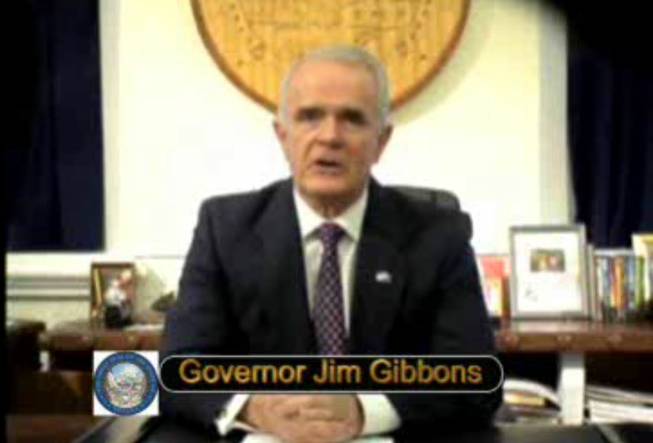
A screenshot from the governor’s video podcast released Wednesday, during which he criticizes the higher education system’s “decided lack of cooperation” regarding the state’s budget.
Wednesday, Feb. 11, 2009 | 6:10 p.m.
Sun Topics
Sun archives
In a podcast posted online today, Gov. Jim Gibbons blasts the higher education system's "outright refusal to deal with a severe economic downturn."
The nearly eight-minute-long segment, during which the governor criticizes the system's "decided lack of cooperation" regarding budget matters, is just the latest round in a yearlong battle of wills between Gibbons and higher education officials.
Last year, when the governor's office ordered state agencies to submit budgets reflecting a 14.12 percent reduction, the higher education system's Board of Regents instead filed a request for a 10.5 percent increase.
The system's chancellor, Jim Rogers, has lobbed public insults at the governor, at one point calling Gibbons and other Nevadans who would not consider raising taxes people “who care nothing about the state, its future, or anything other than their own pocketbook.”
Both sides have held views the other considers extreme. The governor wants to cut the higher education system's state funding by 36 percent, which many legislators have said is unacceptable. The chancellor has said he wants no reductions, despite the state's financial crisis.
In today's Internet address, Gibbons, on camera in suit and tie, points out that unlike other state agencies, the higher education system can raise money through non-state sources including federal grants, revenue from athletics and donations. He calls for student fee increases, calling them "tuition enhancements" and "tuition adjustments."
He also notes, as he did in January when he unveiled his budget proposal, that compared with other states, Nevada spends a larger than average share of its general fund revenue on higher education. That would be true, he says, even under his budget proposal, which slashes state funding for higher education by 36 percent.
"I am simply not willing to cut deeper into core government services like public safety, K-12 education and health and human services," Gibbons says. "That leaves higher education."
Gibbons called the higher education system's "historical reliance" on general funds "a concern."
"Using significant general fund dollars for higher education keeps the higher education system dependent on general tax dollars," he says. "This means system administrators are less likely to pursue other ways to make the system independent."
Higher education officials have said in recent weeks that the governor's characterization of the higher education system's financial situation is misleading. At a regents meeting last week, Dan Klaich, the system's executive vice chancellor, said Nevada falls in the bottom third of states in per-capita state spending on higher education.
He and other higher education officials argue that budget cuts of the magnitude the governor is recommending would devastate the higher education system. The recommended cut to UNLV's state funding, for example, is greater than the amount the school spends on faculty salaries and benefits.
Higher education officials say increasing tuition by large amounts would drive students to drop out of school, resulting in lost revenue.
A decline in state support for higher education would make raising money from private donors and other non-state sources more difficult.
A key example: The Harrah's Foundation has pledged $25 million toward a new hotel college academic building at UNLV, but most of that gift is contingent upon the university finding $25 million to match the donation.
University officials hoped the state would provide the matching funds, but Gibbons did not include the money in his capital improvement project budget for the next biennium.
Securing federal and other competitive research grants will also become more difficult with a decline in state support. With layoffs, buyouts and attrition shrinking UNLV's faculty roster, professors are teaching larger classes, leaving them less time for research. Some of UNLV's most productive researchers are already considering leaving the university in response to budget cuts.

Join the Discussion:
Check this out for a full explanation of our conversion to the LiveFyre commenting system and instructions on how to sign up for an account.
Full comments policy